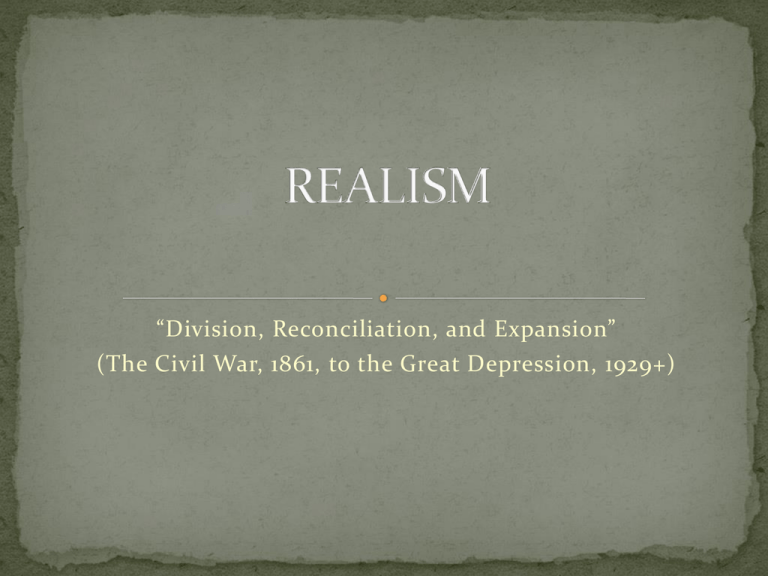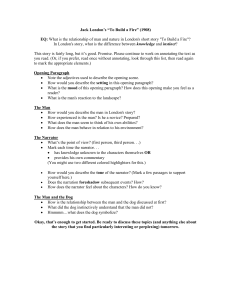REALSIM
advertisement

“Division, Reconciliation, and Expansion” (The Civil War, 1861, to the Great Depression, 1929+) America changed from “a decentralized, agricultural” nation to a modern industrial” nation (464). Civil War (1861-1865) Industrial Revolution (electricity replaces steam, etc.)/Twain’s “Gilded Age” (1880s) Expansion West between the Homestead Act (1862) and the Opening Up of the “Indian Territory” (1889) World War I (1914-1918) The Great Depression (1929+) North-commerce, South-cotton (economies at odds) Expansion of slavery west hotly debated in political, social, and literary circles 1860 Abraham Lincoln elected and South Caroline seceded 620,000 people on both sides, Union and Confederate, died 1865 Robert E. Lee surrendered and Abraham Lincoln assassinated In manufacturing, electricity replaces steam “skyscrapers, department stores, and mass transportation became part of city life—as did noise, traffic jams, air pollution, crime, and slums” (467) “new extremes of wealth and poverty” (467) Immigration to US and especially to urban centers; 9 million people in 25 years Buffalos decimated Native Americans run out: Chief Joseph of the Nez Perce hunted down by US Army in 1877 and admitted, “I am tired of fighting” (467) Disenchantment of the Frontier: Western legends and their heroes are preserved, but actual Western life becomes increasingly pedestrian. Allies vs. Central Powers U.S. enters the conflict after Germany sinks the Lusitania and initiates ongoing submarine warfare Machine guns and trenches made it impossible to make quick or lasting progress Treaty of Versailles ends conflict; Allies win, Central Powers lose 9 million die After a period of prosperity following WWI, the NYSE crashes in 1929 In three years, ¼ of the entire workforce loses their jobs Enchantment becomes Disenchantment; Idealism becomes Realism; the Possible becomes the Probable “Writers attempted to show ‘real life’ as ordinary people lived it and attempted to show characters and events in an honest, objective, almost factual way” (470) Naturalist Realists (opp. of Transcendental Romantics) told particularly rough, hard, austere tales; believed forces larger than individuals, forces like Nature, Heredity, or Fate, controlled individual destinies A man said to the universe: “Sir, I exist!" “However,” replied the universe, “The fact has not created in me “A sense of obligation.” “An Occurrence at Owl Creek Bridge” by Ambrose Bierce “An Episode of War” by Stephen Crane “To Build a Fire” by Jack London “The Story of an Hour” by Kate Chopin Narrator: third person Narrator’s Tone: formal, detached, unsentimental Narrator’s Design/Doings: reportage, what else? Plot an unnamed man stands upon railroad bridge ready to be hung and thinks about wife and kids his history provided at the moment of his execution: how he was tricked by a Federal scout into revealing his desire to undermine the Federal army man “fell straight downward through the bridge . . . and was as one already dead” (511)=“lost consciousness” (511) long period of subjective time passes that is later revealed to correspond to a short period of real time; during that span the man falls into the river, unties himself, struggles to evade being shot, and returns home to his family (in other words, he seems to survive and escape) man then “feels a stunning blow upon the back of the neck” and a “blinding white light blazes all around him with a sound like the shock of a cannon” (516)=“was dead” (516) Narrator: third person Narrator’s Tone: straightforward, frank Narrator’s Design/Doings: reportage, what else? Plot an unnamed lieutenant portions out coffee to his company of soldiers when he is, without warning, shot in the arm he cries out in pain, looks around confused, tries awkwardly to sheathe his sword, and finally wanders off in the direction of the hospital he sees many things, wounded and therefore removed from battle, that he would not otherwise have seen; they all seem oddly inexplicable (because artificial); one scene is “precisely like a historical painting” (478) the lieutenant visits the doctor, feels looked down upon, feels like he might deserve such treatment, but puts up a fight when he fears his arm will be amputated the doctor promises his arm will be saved, but he does not save it; “And this is the story of how the lieutenant lost his arm” (480) He internalizes the treatment he receives from the doctor, and, ashamed, feels nevertheless forced to accept his fate; he downplays his injury when he shows it to his “sisters, his mother, his wife” (480) Narrator: third person Narrator’s Tone: distant, condescending, even sardonic Narrator’s Design/Doings: reportage, what else? Plot a chechaquo in the Yukon Territory, accompanied by his dog, turns off from the main trail on a bitterly chilly and dismal day “quick and alert in the things of life, but only in the things, not in the significances” (609), the man starts off by failing to be cowed by the elements and pressing rashly ahead in order to meet his friends for supper His dog, “[whose] instinct told it a truer tale than was told by the man’s judgment” (610), grows increasingly suspicious of the man The man falls through some ice and gets wet; he builds and lights one fire, but it is put out by falling snow; he builds a second fire, but his hands are frozen by the time he does so, and he burns his own flesh in the course of trying to light it eventually, he gives up, and, without a fire, he tries to kill his dog and climb inside its skin; however, the dog catches on to the man’s strange behavior finally, the man tries to run off the frost, but he falls down and fails; he eventually starts hallucinating, and then sleeping, and then he dies Narrator: third person Narrator’s Tone: detached, dry, but knowing Narrator’s Design/Doings: reportage Plot Mrs. Mallard is afflicted with “heart trouble” (636). her husband’s friend breaks the news to her that her husband has died in a railroad disaster. she weeps violently, goes upstairs, shuts herself in her room, looks at the sights through the window, and slowly realizes that she is, contrary to expectation, glad of the news— because she can now be her own master. Brentley Mallard returns home, actually unaffected by the aforementioned disaster, and the shock of seeing him again kills Louise. Louise’s doctors, in a dramatic ironic last line, misdiagnose her fatal illness as “the joy that kills” (638).





